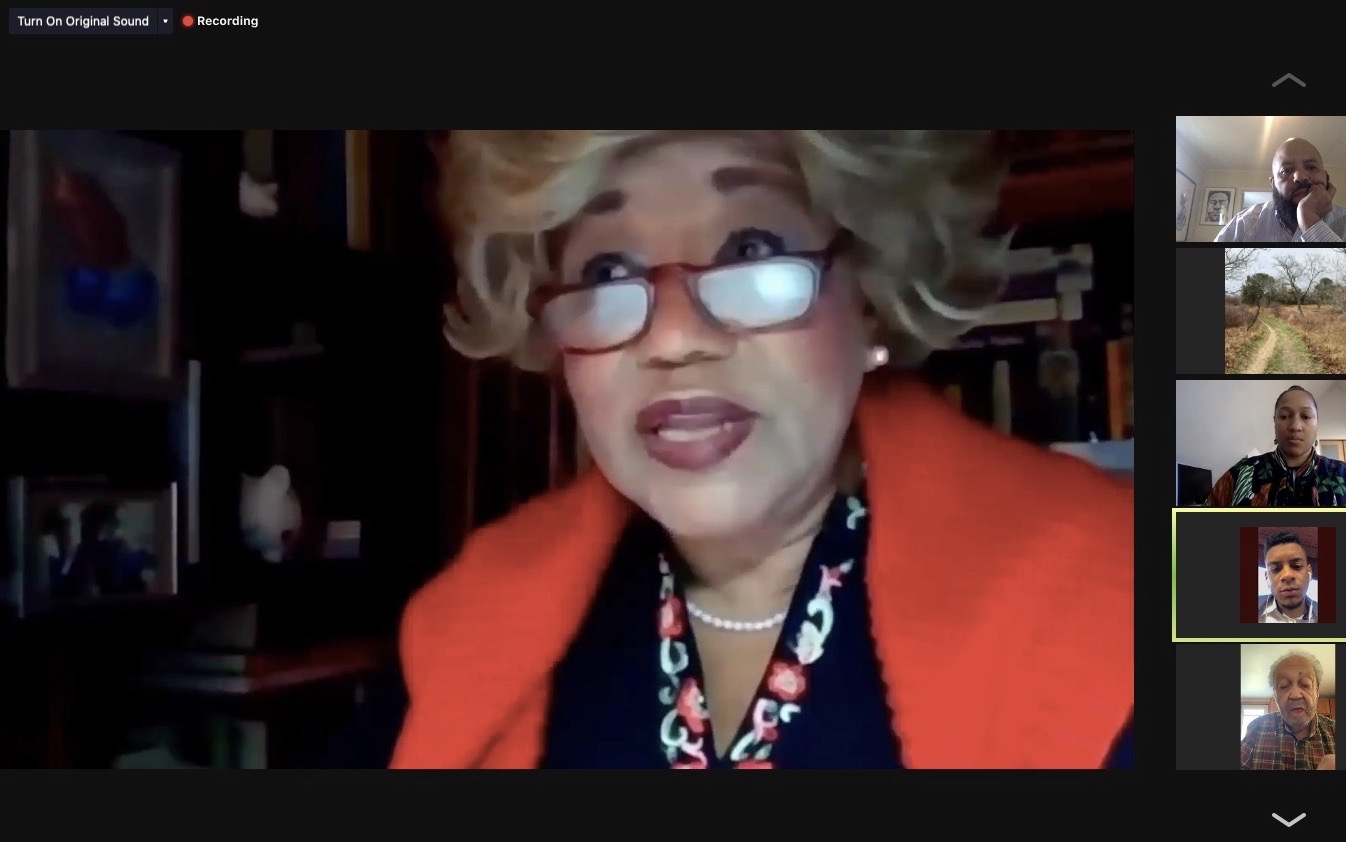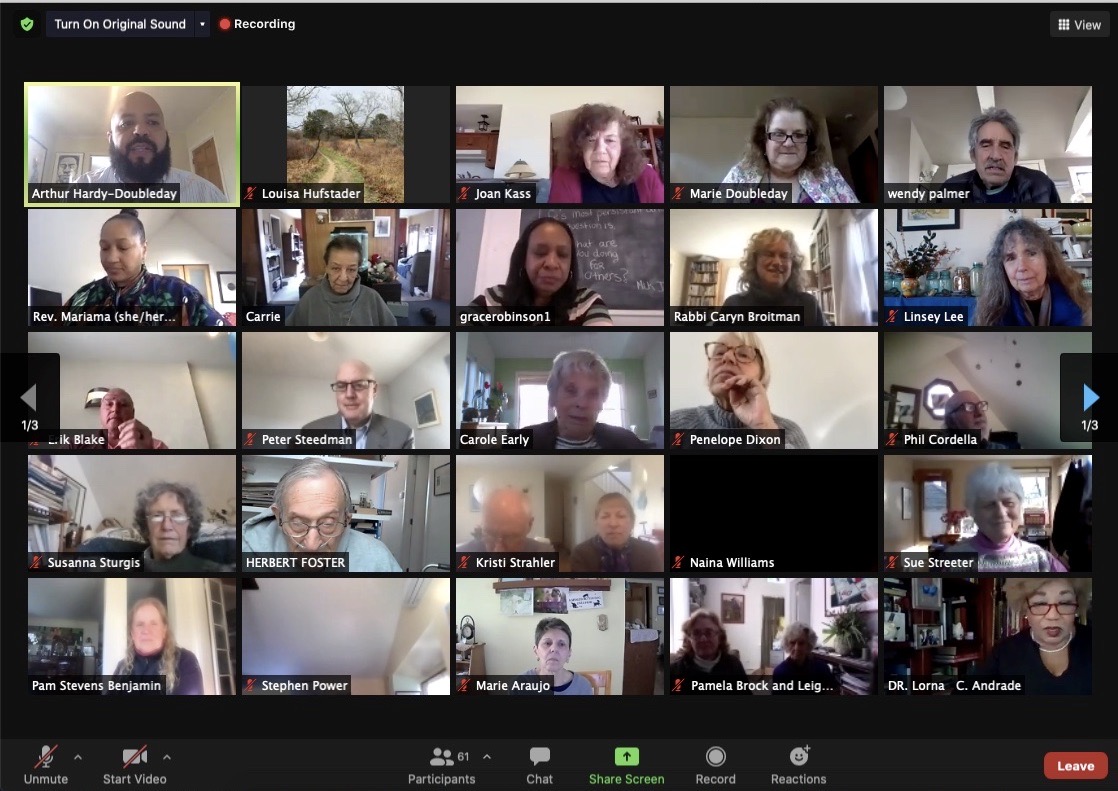More than 65 people joined this year’s Martin Luther King Jr. Day talk and membership drive held by the NAACP of Martha’s Vineyard on Zoom.
“I wish we were all together like we always are, with a sense of community,” outgoing NAACP of Martha’s Vineyard president Erik Blake told the group. “Usually we’re cooking, and there’s music.”
But even without the traditional luncheon, the spirit of community was in good supply at Monday’s gathering, beginning with Mr. Blake’s words of gratitude to the NAACP executive committee for supporting him as president over the past 10 years.
“You made my job easier, and I really pray we did good things,” Mr. Blake said.
“I’m looking forward to new leadership at the top and positive momentum,” continued Mr. Blake, who said he will remain on the executive committee to support incoming president Arthur Hardy-Doubleday.
Mr. Hardy-Doubleday then led the event, which began with a prayer by Rabbi Caryn Broitman.
“May we all understand that the dream as envisioned by Martin Luther King... is built by our actions beginning today,” Rabbi Broitman said. “Strengthen us when we falter and lift us to reach our highest aspirations, speedily and in our day.”
In a short video produced by Grace Robinson, three NAACP members shared their experiences with the group.
Retired nurse and medical professor Lorna Andrade recalled growing up during the civil rights movement in Boston, where she met Dr. King during his visits to a church in her grandparents’ Roxbury neighborhood.
“It was so exhilarating,” Dr. Andrade said. “I knew then that I had to keep learning and trying to help eradicate racism.”
After marching and singing in freedom choirs as a teenager, Ms. Andrade grew more involved in the movement and began attending NAACP meetings on the Vineyard, even when she wasn’t living here full-time, she said.
“If you want to make change you have to be a part of it,” she said. “My NAACP journey on Martha’s Vineyard has been a wonderful journey.”
Members Kathy Ashton and Russ Ashton were also featured in the video.
“We try to advocate for those who are excluded,” Ms. Ashton said.
“I personally find it humbling to work with and join more than two million other people on this journey,” she added.
Mr. Ashton spoke briefly about the recent assault on the government in Washington, D.C., and the contrast between what many see as a mild police response to the deadly riots compared to what greeted Black Lives Matter protesters around the country last year.
“We people of color — demonstrating, mind you, not looting or anything else, just demonstrating for our rights — we were slapped, disgraced, abused, and the other people just walked into a building like they are privileged people,” Mr. Ashton said.
“Well, guess what? NAACP and people of all colors are privileged, and we will march on,” he continued. “We will make it a great place, a home for everybody.”
“This is our nation, this is our song,” he added, paraphrasing the lyrics from Lift Every Voice. “I say ‘our song,’ because how sweet it is when we can sing together in a joyous voice to make peace for everybody and make sure everybody has a successful life,” Mr. Ashton said.
Monday’s keynote speaker was Rev. Mariama White-Hammond, the founding pastor of New Roots African Methodist Episcopal Church in Dorchester and an activist for the environment as well as racial justice.
“For many of us, these last four years have been challenging,” Rev. White-Hammond said. “It’s been tough to watch children stripped away from their parents; to hear words and see symbols that we never thought would march through our streets; to not hear the condemnation we have come to expect from our leaders.”
“We have seen an assault on truth, an inability to even come to a clear consensus about the facts before us,” she continued. “We’ve always been a country of different experiences, but now sometimes it feels like we are living on different planets.”
The upcoming transition of power in Washington offers Americans concerned with racial and social justice an unparalleled chance to intensify their efforts for change in the wake of the last four years, Rev. White-Hammond said.
“There is a deep temptation to want to get back to what was, [but] we have everything laid bare, exposed, for us to see,” she said. “In this moment, we have seen the deep racism within our health care system and our criminal justice system. Everything is out in the open.”
Rev. White-Hammond ended her speech with five immediate recommendations for civil rights activists.
“The most important question for us in 2021 is not how we will get through this moment, but how we will prepare to come out of this pandemic to do better and be better than we ever have been before,” she said.
Number one on the reverend’s list: Get some sleep.
“Our system chews people up and spits them out and sometimes rest...is an important form of resistance to a system that dehumanizes people,” Rev. White-Hammond said.
“You can’t have good dreams if you don’t have good sleep,” she added, referring to Dr. King’s famous speech.
Along with getting better rest, she also encouraged people, particularly people of color, to receive the Covid-19 vaccine.
Rev. White-Hammond’s second recommendation was to remain vocal about the country’s inequities.
“We need to name the bounced checks and broken dreams of our society,” she said. “We need to keep them in front of us. If we don’t name them, we don’t have the opportunity to change them and transform ourselves.”
Third, she said: “Imagine the dream.”
Many Americans are resistant to change because they don’t see their place in a changing nation, she continued. “We have not always developed our ability to imagine and build. If we can’t imagine it, then we can never build it.”
Her fourth recommendation was to listen to younger people and widen the leadership circle.
“We need to continue to make spaces for new voices, younger voices, people whose minds have not been jaded by the reality of what is,” she said.
Finally, Rev. White-Hammond encouraged her listeners to take action on their visions of a better future.
“Live into the dream,” she said. “How do we begin to live into new ways of being that can bubble up and become the ways we run our society?”
There’s no need to wait for national leadership, she continued.
“All of these are things we can do without waiting... without praying for some new, great leader, without waiting to the point that Washington can function. These are all things we can do to emerge from this moment better than we ever were.”
After a brief discussion period, Monday’s event concluded with a sing-a-long of Lift Every Voice, a poem written in 1900 by NAACP member James Welden Johnson with music added by his brother John in 1905.
Pianist Terrell Richmond performed the song, widely known as the Black National Anthem, on video before Mr. Hardy-Doubleday ended the videoconference.
“Next year we will be breaking bread together,” Mr. Hardy-Doubleday said.
Membership in the NAACP of Martha’s Vineyard is $40 for adults and $20 for those under 21. General membership meetings are held on the third Saturday of every month at 11 a.m. on Zoom. More information is available at marthasvineyardnaacp.org/.







Comments
Comment policy »